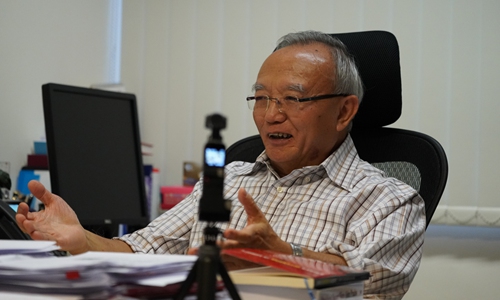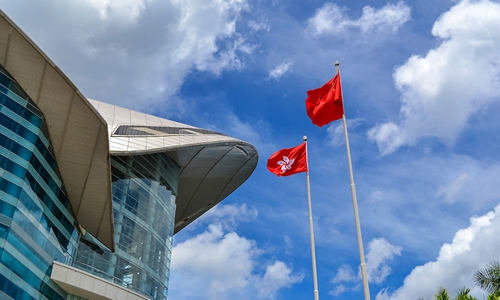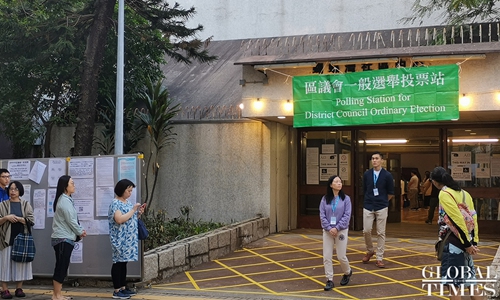HOME >> CHINA,SPECIAL-COVERAGE
HK political battle to intensify
By Chen Qingqing and Bai Yunyi in Hong Kong Source:Global Times Published: 2019/11/27 23:58:40
Pan-democrats unable to decide chief executive: adviser

Lau Siu-kai, the vice-president of the Chinese Association of Hong Kong and Macao Studies, is interviewed by the Global Times on Wednesday.
After pan-democratic groups scored a big win in the district council elections on Sunday, a leading adviser of Beijing's top think tank on Hong Kong affairs predicted that the political battle would further intensify in the city. The opposition may gain 40 percent of seats at the Election Committee, but they won't be able to decide who will be the chief executive as the majority is still in the hands of the pro-establishment camp.
The latest district council election took place amid social unrest, which hardly delivered a clear message. After the opposition groups won by a landslide, they will use district councils as their base for continuing political battle, turning the district council, usually place to address issues related to people's livelihood, to a highly politicized place to exert influence on public opinion and create pressure on authorities, Lau Siu-kai, the vice-president of the Chinese Association of Hong Kong and Macao Studies, told the Global Times in an interview on Wednesday.
Pan-democratic groups won 388 out of 452 seats in Sunday's elections, controlling the majority of the district councils, while Democratic Alliance for the Betterment and Progress of Hong Kong gained only 59 seats, a result significantly different from last elections when the latter controlled the majority of seats years ago.
"Although opposition camp won the victory, about 40 percent voted for pro-establishment camp, showing that the fundamental base of supporters for the camp has not changed," Lau said.
The voting results show there has been no significant gap between pan-democratic camp and the pro-establishment party, as the latter took about 45 percent of total votes, and the opposition force took around 60 percent. Considering the system of a "single-seat, single-vote" electoral system, the opposition force could gain a majority of the seats, Lau said.
"The fundamental support base for the pro-establishment party has not changed, and some candidates even gained votes compared to the previous elections," he noted.
The turnout at this year's elections surpassed 70 percent, the highest in history, and many newly registered voters are youngsters who have been voicing opposition toward the Hong Kong Special Administrative Region government during months of anti-government protests, which have escalated into violence.
In the past, the voter turnout for district council elections was relatively low, as not many people were interested in electing members who deal with social and livelihood issues. "However, it has been becoming more politicized, about political agenda and political parties," Lau said, noting that although it's abnormal, the district council still remains an advisory body that exerts a certain influence on policymakers.
There are no clear boundaries as to what role district council could play, which gives room for council members to bring up political topics and agenda, further influencing public opinion, Lau noted.
Chief Executive Carrie Lam Cheng Yuet-ngor also admitted that this year's election was a particular one, which has a more political dimension to it amid unstable and violent environment and chaotic situation. And newly elected district council members are expected to shoulder their responsibilities as the councils, as advisory body, are an important part of Hong Kong's political life.
"Scoring a big win at the district council election won't guarantee pan-democratic groups could seek further influence on government's policies, or take control of the authority," Lau said, noting that the final say is still in the hands of the SAR government over policy implementation. As long as pro-establishment members are united, opposition forces won't have any chance," he said
While some raised questions about why the majority of Hong Kong people votes for opposition groups, reflecting an anti-Beijing public opinion, Lau claimed that such claim has been exaggerated.
"There's been unnecessary worry among some Hong Kong people, as they think the central government will take measures to weaken Hong Kong's autonomy, and such misunderstanding has been deepened amid widespread anti-government mood," the senior advisor said.
When Chinese leader Deng Xiaoping proposed the "one country, two systems" principle, he never asked Hong Kong people to love the Communist Party of China, Lau noted. "Hong Kong could always maintain its original system, lifestyle and values, including its recognition of Western values," he said, adding that as such, Hong Kong people would be assured and the city could continue playing its unique role of connecting China with the West.

Photo: VCG
Reflection needed
The pro-establishment group and HKSAR government said they would seriously reflect on a general mood that is unsatisfied with the way the authority governs, which resulted in the election results.
However, Lau, the senior adviser to both HKSAR government and the central government, said defeat in the elections would enhance crisis awareness, helping to enhance solidarity among Beijing, HKSAR government and the pro-establishment camp.
It's widely believed that the ultimate goal of pan-democratic camp is not to win the majority at the district council, but to win at next year's Legislative Council elections, which will pave the way for them to grab more seats at Election Committee for selecting the next chief executive in coming years, observers said.
"Although it has not shaken Hong Kong's fundamental political landscape so far, the HKSAR government is urged to cooperate with the pro-establishment camp and to change its stance of governing without taking others' suggestions into account," Lau said.
While pro-democrats' control of district council may further exert influence on election commission for selecting the chief executive, Beijing is expected to reconsider its policies concerning Hong Kong affairs.

HongKongers on Sunday line up in front of the different polling stations across the city, voting for District Election Council. Photo: Yang Sheng/GT
Further measures
The Hong Kong government should come up with preventive measures as Beijing would never tolerate an opposition force posing a threat to national sovereignty, Lau said.
Western media and politicians praised the district council elections as "de facto referendum on Hong Kong democracy," but Lau said the "one country, two systems" is still the best arrangement.
"The central government will continue using its power to safeguard 'one country, two systems', particularly to come up with measures to crack down on secessionists," he added.
Opposition groups in Hong Kong, echoing values and expectation of Western countries, may continue confronting the central government, when the West continues to smear the Chinese model of development as populism rises in the world.
"But they need to understand that keeping political position in line with national interests is the only way to maintain 'one country, two systems' principle that ensures the future of Hong Kong," Lau said.
After the Hong Kong High Court ruling on the anti-mask law was not in line with the Basic Law, posing a blatant challenge to the authority of the Standing Committee of National People's Congress and the chief executive of HKSAR, the Legislative Affairs Commission of the Standing Committee of the National People's Congress expressed deep concerns over the ruling.
"Such an attitude shows that the central government increasingly considers Hong Kong affairs from a national security perspective, as external forces challenge national sovereignty and seek to seize control of governance," Lau said.
Under the current situation, the central government would probably clarify the power of the central government on Hong Kong issues. "And the interpretation of the Basic Law would become more normalized, to make sure that the 'one country, two systems' principle is carried out in an accurate and comprehensive way," Lau added.
Posted in: HK/MACAO/TAIWAN,FEATURE 3